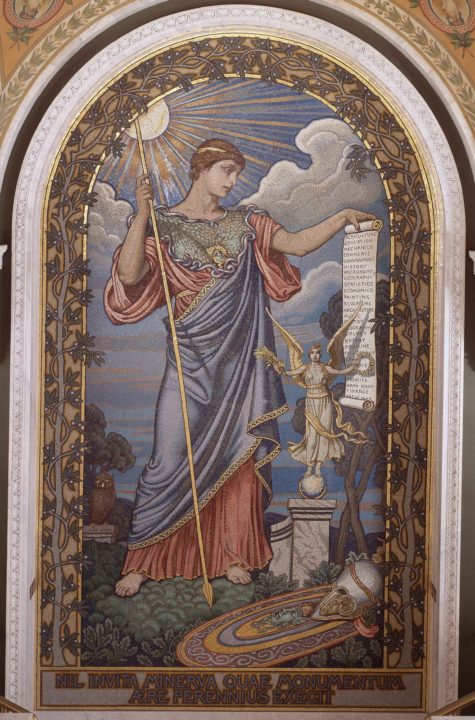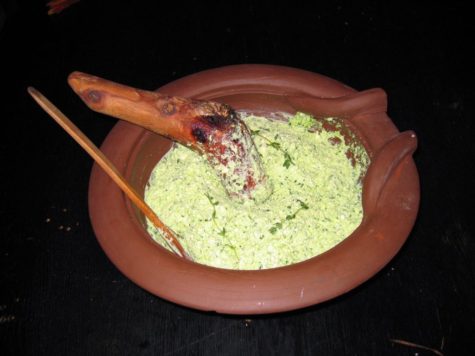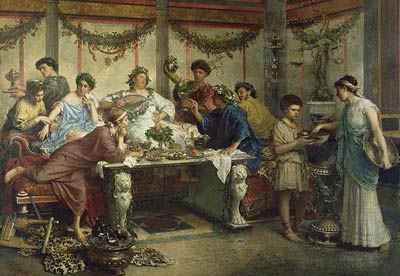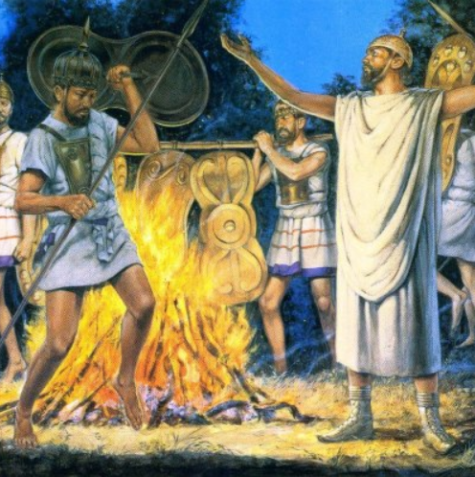Daily Archives: March 20, 2017
March 23 is the fifth day of the Quinquatria. A five day Roman festival to honor Minerva which coincides with the five day Ancient Greek festival to honor Athena – her Greek counterpart. Here is a ritual designed for group participation. It can, however, be modified for the solitary practitioner.
- Colors: Blue and brown
- Elements: Air and earth
- Altar: Upon a brown cloth light five blue candles, incense, and many tools of the crafter.
- Offerings: Make something.
- Daily Meal: Let those whose craft is cooking or baking make what they will as an offering.
Quinquatria Invocation III
Bones and clay of earth,
Flesh of trees and vines,
Thread from plant and animal,
Metal drawn from the ground
And forged in fire,
Our hands are midwives
To these unformed substances,
Given to us by the grace of the Mother,
As She gifts all her children.
We birth creations of beauty
That bring a smile to the eye,
We birth creations of usefulness
Made to be seized and worked day after day,
Fitting easily into the hand
That uses them unthinkingly.
Oh, ye many gods of the sacred touch,
Grant us the power to make manifest
With these our own humble hands.
(All approach the altar and select a tool, and speak their intentions towards it. Tools are then taken outside and laid on the Earth, and the Tool Blessing is said over them. Then, for the rest of the day, craftwork will be done, or things made or repaired.)
Tool Blessing (to be spoken or chanted or sung):
Father Labor, Mother Survival,
All brown gods of work and sweat;
Strong of arm, feet on Earth,
Bless this tool in Earth I set;
Sharp and keen, firm and fine,
Never break and never bend;
Be my strength, aid my skill,
Fill my hand and be my friend.
Found in: Pagan Book of Hours
Our recipe this week is straight out of the pages of Roman literature. Moretum is a delicious spread similar to our pesto—and the Roman poet Virgil was apparently a big fan!
The word “moretum” is Latin and is usually translated as “salad,” but that’s not really an accurate translation. It’s not a salad at all, at least not what we think of as salad in modern times. It’s a sort of spread or dip. Virgil is most often credited with the recipe. In his poem entitled “Moretum” he tells the story of Symilus, a peasant farmer, who is making his morning meal. He first makes the bread, but quickly realizes he has no meat to go along with the crusty creation. Concerned that man cannot survive on bread alone, he decides to make an accompaniment for his baked good. Virgil then describes the process by which Symilus makes his moretum. Both the bread and moretum-making are described in detail in the poem, but here is a little summary of the important moretum highlights, courtesy of Pass the Garum blog:
- Symilus gathers four heads of garlic (!), celery, parsley, rue, and coriander seeds.
- He grinds the garlic in his mortar and pestle, and adds salt and cheese.
- He then adds the celery, rue, parsley, and coriander seeds. The smell is so strong that it makes his eyes water!
- He adds some olive oil, finishes off the mixture, and slaps some on his freshly baked bread.
There are a couple of things about this recipe we will not be replicating in the recipe below. For one thing, there is an awful lot of garlic. We’re going to tone that down a bit, but feel free to pile it on if you’re a garlic fan. The Romans loved garlic. They believed it increased “strength and endurance” and so it was fed to “soldiers and sailors.”
It was also believed to “clean the arteries” and guard against toxins and infections. Today we know that garlic is often effective in treating and preventing many different ailments including, but not limited to, blood and heart conditions, some types of cancer, diabetes and even the common cold and flu.
More important than the potential overuse of garlic, rue is poisonous. However, rue is not altogether bad. In fact, it contains alkaloids that made it a useful treatment for indigestion during this time period (1st century BCE). But it also strongly influences the female menstrual cycle so pregnant women should definitely not consume it. We chose a recipe that leaves it out altogether.
Now that we’ve explored some history and cut out the dangerous ingredients, it’s time for a pesto party! Bake (or buy) a loaf of delicious bread to eat with your moretum and have some friends over for a night of Roman cuisine.
Roman Garlic Pesto (Moretum)
Ingredients
- 1 clove of garlic
- 1/2 of a celery stick (with its leaves)
- A small bunch of flat-leaf parsley
- 1 tablespoon of coriander seeds
- A pinch of salt
- Some aged pecorino cheese (approx. 8 ounces), feta is also a popular option
- 1 teaspoon of extra virgin olive oil
- A splash of vinegar
Instructions
Peel the garlic, add to the mortar and grind.
Add the salt, the cheese and the celery to the mortar and mash them up too. Really make sure to mix them well with the garlic from earlier.
To this paste, add the coriander seeds, parsley, oil and vinegar. I find that it is helpful to add the parsley in batches and break it down bit by bit rather than trying to do it all at once and making a mess. Test for flavor – if it is too garlicky, add more parsley.
Grab some bread and dip or spread ‘til your heart’s content!
From: Antiquity Now
In Ancient Roman religious tradition, The Hilaria (Greek: ἱλάρια; Latin: hilaris, “hilarious”) were festivals celebrated on the vernal equinox to honor Cybele, the mother of the Gods. The Romans took this feast originally from the Greeks, who called it ΑΝΑΒΑΣΙΣ, (Ascensus)
The day of its celebration was the first after the vernal equinox, or the first day of the year which was longer than the night (usually March 22) . The winter with its gloom had died, and the first day of a better season was spent in rejoicings.
The manner of its celebration during the time of the republic is unknown, except that Valerius Maximus mentions games in honor of the mother of the gods. Respecting its celebration at the time of the empire, we learn from Herodian that, among other things, there was a solemn procession, in which the statue of the goddess was carried, and before this statue were carried the most costly specimens of plate and works of art belonging either to wealthy Romans or to the emperors themselves.
All kinds of games and amusements were allowed on this day; masquerades were the most prominent among them, and everyone might, in his disguise, imitate whomsoever he liked, and even magistrates.
Here is a nice ritual to honor Cybele on her day from the Pagan Book of Hours:
- Color: Golden
- Element: Fire
- Altar: Upon a golden cloth set five gold candles, a chalice of wine, the figure of a lioness, and a crown resembling a turreted city.
- Offerings: Lions, herbs, wild game, music.
- Daily Meal: Game birds, such as turkey, goose, pheasant, or quail. Moretum – here’s recipe: Ancient Roman Garlic Pesto.
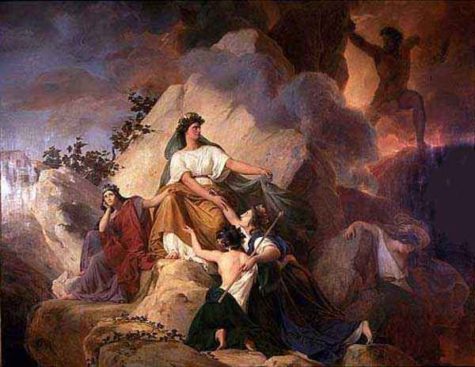
Invocation to Cybele
Magna Mater
Great Lady of the City
Protector of Civilization
Inspirer of music in the city streets
And in the high houses,
Queen upon your throne,
Guard the lands of stone and metal
Where the feet of thousands tread.
Magna Mater
Great Lady of the Wilderness
Protector of the Wild Things
Inspirer of music in lonely places
And in the deep metro’ons,
Lioness who hunts your prey,
Guard the beleaguered lands of untouched Nature
Where few feet tread
Save for the children of Earth whose steps belong there.
Magna Mater,
You who understand both worlds,
Do not let us forget
That both are valued in your eyes
That both hold promise and treasure
And that we must learn to live in both
If we are to survive.
(Beat drum and clash cymbals during chanting.)
Chant:
Magna Mater Cybele Cybele
Source: Wikipedia
In the Roman calendar, March was sacred to Mars. The “jumping priests,” or Salii began the Festival of the Salii on March 21 with a purification of the sacred trumpets that the Romans carried off to war. That date was originally the Roman New Year’s Day because it was the start of the growing and campaign season.
On March 21, the Salii marched to the Regia taking the bronze Ancilia, the sacred shield that had fallen down from heaven, and its 11 copies. They danced through the streets carrying poles with the shields mounted on them in their left hands. With their other hand, they banged the shields with a drumstick. Even in the time of Cicero, the Carmen Saliare they sang was so ancient that he could not understand it.
At the end of each night, they would stop at a place to be feasted before starting up again the next day. This festival would end on March 24 when they would return to the Regia and return the shields.
Found at Wikipedia
Birth date:
- Mar 21
Key word: Brave
According to some astrological traditions, it is said that if you were born on March 21st, you were born under the sign of the Oak tree. Persons born under this sign tend to have a robust nature. They are courageous, strong, unrelenting, independent, sensible, do not like change, keep their feet on the ground, a person of action.
Source: Wicca Chat
Artist: Marcia Baldwin
March 21 is the third day of the Quinquatria. A five day Roman festival to honor Minerva which coincides with the five day Ancient Greek festival to honor Athena – her Greek counterpart. Here is a ritual designed for group participation. It can, however, be modified for the solitary practitioner.
- Color: Blue
- Element: Air
- Altar: Upon a blue cloth lay many musical instruments, blue candles, a clear glass bowl of water, and a fan made from a bird’s wing.
- Offerings: Song and music.
- Daily Meal: Light vegetarian meal.
Quinquatria Invocation II
(to be sung)
Hail Athena, true and bright,
Sharp your blade and keen your sight,
Goddess of a Thousand Works,
Giver of the soul in flight.
Guide our touch as we reach out,
Weaver, crafter, artisan,
Guide our urge to build and make,
Guide the power of our hands.
Mentor, teacher, patient tutor,
Maker of heroes through the years
In the epic glance of history,
Giving sight to blinded seers,
Giving purpose to the wanderer,
Giving courage to the weak,
We beseech you, armored Lady,
By the Word of Power you speak,
Like the wind that blows so cold
And bright and clear through minds of grey,
Stand beside us when we falter,
Sweep our weakness clean away.
(The rest of the day should be spent in song, whatsoever has been chosen by the community as the absolute best that they can do, as an offering. Songs can be solo offerings, or as a group. Those who wish to give private offerings can play instrumental music after the main group has left.)
Found in: Pagan Book of Hours
